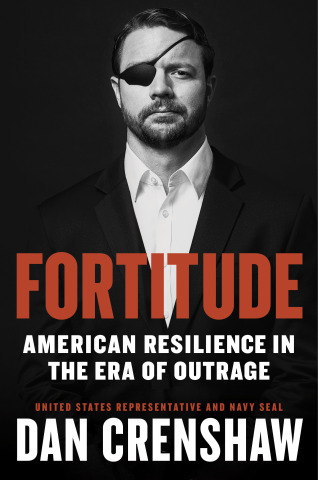 Fortitude
Fortitude
By Dan Crenshaw
Released April 4, 2020
Grand Central Publishing
Paperback: 256 pages $29 Hardcover; $13.99 eBook
ISBN-13: 978-1538733318
Reviewed by Gila Hayes
Texas Congressman Dan Crenshaw, like many in political life, raises hackles on both sides of the political spectrum with his public statements reflected, inevitably, through the echoes of his comments as filtered by news reporters and social media. All that chatter moved me to read Crenshaw’s book, Fortitude.
Fortitude inspired me to check my own blind spots through its analysis of the “outrage culture.” Crenshaw’s premise is that society has grown increasingly petty, reveling in emotional outbursts instead of working toward positive growth and concrete accomplishment. “If you’re losing your cool, you are losing. If you are triggered, it is because you allowed someone else to dictate your emotional state. If you are outraged, it is because you lack discipline and self-control,” he writes.
In the introductory pages, Crenshaw suggests that when faced with disagreement, many people misinterpret opinions that differ from their own for actual, physical danger. They justify striking back with genuine violence and destruction, encouraged by “opinion journalism,” social media and educators, he explains. The emotion of outrage has replaced taking action to correct wrongs.
“Outrage is weakness,” Crenshaw asserts. “It is an emotion to overcome, not accept, and overcoming it requires mental strength. This book is about acquiring that necessary mental fortitude.” Later he suggests, “these days, too many people are overcoming their knowledge deficits with passion, and too many more people are mistaking ‘passion’ and ‘authenticity’ for righteousness and sophistication.” We would do better, he comments, to pause before reacting, to consider opposing viewpoints by asking questions and exercising curiosity. “Be still; delay your reaction. Be skeptical and consider alternate possibilities. Hold multiple potential scenarios in your head at the same time,” recommends Crenshaw.
Inner strength embodies, “Acceptance for what you truly can’t control, but responsibility for what you can control,” Crenshaw writes. He discusses the relationship between inner stillness, outrage, and personal responsibility. Whether faced with a threat to life or an angry verbal barrage, skill at accessing inner stillness prevents panicked responses that waste energy and do nothing to solve the problem. Stillness is a practiced skill, he stresses.
To get that practice, he suggests, “mentally walking through various scenarios and then imagining your ideal reactions to those scenarios...So when it does happen, you’ve already thought through the action and it comes with ease. You are better prepared. Your mind is freed to embrace new, unexpected challenges...Imagine how you would want to be seen reacting to a difficult situation, and simply think about reacting that way. You will be amazed at the effects.” Practice on small problems, he recommends, noting that if you practice inner stillness and control emotional reactivity, your inner strength will be available when needed for larger, more threatening situations.
We live in a golden age, but many people suffer from anxiety. “With many big problems cured, reduced, or eliminated, our small problems have been elevated remarkably in our public discourse,” Crenshaw observes. “The miracle of modernity has done some amazing things, but it has also softened us a great deal. The likelihood of experiencing a truly harrowing situation, let alone many of them, is near zero and our resilience has suffered for it. This means you’ll never know how you would react, and it means you have very few opportunities to practice for it when the time comes.”
Crenshaw wonders if today’s Americans could survive problems faced by past generations. He writes, “There was once a time when we were occupied by a seemingly indomitable monarch, there was a time when the White House burned and the flames could be seen from the Potomac River. A time when we split ourselves in two over the great moral injustice of slavery, when a depression laid waste to our land, and when Nazi and Communist thugs were stopped from world domination only by the courage of our Greatest Generation.”
What would it take to regain the fortitude of past generations? Crenshaw suggests that people are inspired by stories and look to heroes for examples of good character. He writes that humans are designed to “think in narrative, bringing to bear the full range of our God-given reason and emotion” to understand “ourselves and our place in the world.” Commentary follows about developing the traits of humor, productivity, reliability, temperance, self-discipline, even-temperedness, humility, and listening to points of view outside our own. “Stories are practice runs for the mind. We hear them, we read them, and we act out our own role within them,” he writes. We chose whether to cast ourselves as victims or as responsible victors over hardship in our own stories, he teaches.
Crenshaw’s list of desirable traits is daunting, so he recommends achieving small goals moment-to-moment. Overcoming hardships both large and small yields self-confidence and the mindset of, “If I can do this one hard thing, maybe I can also do the next hard thing.” Pursue excellence in small details, he urges. If you aspire to stop losing your cool, adopt a detail-oriented approach to your day. Use sarcasm and humor to defuse the little stressors. “We allow ourselves to sweat the small stuff because we strive to be detail oriented. Details matter. Paying attention to detail is an absolute must for performing successfully in life, whether in the life-and-death situations of combat or doing payroll for your business...blow off steam in a healthy way so that when bigger problems arise, you are more emotionally capable of dealing with them,” he writes.
Crenshaw doesn’t demand perfection, only responsibility and accountability. “The road to mental toughness is paved with the knowledge that we don’t always do what is right, but we are willing to take responsibility for it, humbly correct it, and be stronger as a result. A mind that cannot bend to admit wrongdoing is easily broken. Don’t be breakable. Live with fortitude.”
Embrace challenges, Crenshaw urges, citing studies that suggest inner strength can grow out of traumatic events. “This type of change is known in the psychological literature by a number of labels: posttraumatic growth, stress-related growth, positive adjustment, positive adaptation, and adversarial growth,” he quotes. “You have control over your thoughts, and your thoughts are more powerful than you may realize. Healthy habits create a healthy mind, and a healthy mind creates healthy people. Doing something hard is the habit of building mental calluses so that when life happens, you are better prepared for it.”
What happens if failure strikes? Examine your perception of events and actions leading to failure, Crenshaw challenges. “After every failure, after every hardship, we create a personal narrative to account for that moment. We tell ourselves a story. We may not control the event itself (though we probably have more control than we think), but we certainly control the story that comes out of it.”
“When failure comes, there are a series of questions we have to ask ourselves: ‘Which actions of mine caused this? What could I have done differently? What will I do when and if it happens again?’ Note something important about these three questions: They’re all inwardly focused. They’re all about personal responsibility. They all accept and face circumstances.” Blaming others robs you of the one factor that you can control: yourself and your choices. Ask instead, what did I do to cause this? Crenshaw notes, “This is a necessary exercise, because you will encounter failure at some point in your life. And having a mind properly disciplined to learn from that failure is vital to self-improvement, growth, and earning the respect of your peers.”
Taking responsibility is hard but leads to stronger character if we nurture self-talk that require us to be better people. “At first it may be an internal narrative, but that narrative eventually makes its way into reality,” he states, concluding with the message that, “The pinnacle of failure is the refusal to take responsibility for mistakes and transgressions, and instead blame external factors.”
Political leaders have to think beyond the individual, but change starts with each of us. Crenshaw explains, “When one person stops taking responsibility for their actions, the unspoken implication is that they are expecting others to take responsibility for them. This is a toxic mentality...as responsibility is slowly diffused until there is none at all.” Each citizen is a thread in the “larger fabric of our culture,” he writes, so it is essential that each shoulders responsibility for their own happiness and success. Will we decide that we are not victims of external forces? The answer is in the stories we tell ourselves, according to Crenshaw. “We must decide to tell the story of America that embodies the founding ideals and gave us the miracle of opportunity that we have today. We must tell a story that we are proud of.”
Crenshaw closes with a call to embrace ideals of never quitting, never justifying taking the easy way out, realizing that even small actions matter, developing strength by going through hardship, being grateful, and practicing stillness in the midst of chaos. In spite of my distaste for partisan politics, I was inspired by this politician’s message. The time I spent reading Fortitude was time well spent.
To read more of this month's journal, please click here.
